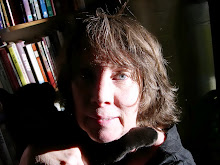the four wheeled ones
I don't drive. It's one of the more peculiar things in my nature. During much of my life it was not a problem at all, because I lived in some of the worlds most lovely cities, where public transportation was a given and a delight.
Here in the country it has been another matter, but I get by okay.
Still, I never particularly thought cars were a category that got into my mind or heart very much. I'd be a horrible witness: "Yes, officer, it was--I think--a car. What kind? Oh, a one with four wheels and , like, a roof."
But we just adopted a new car. New to us, a 1994 Geo metro, with four doors, meticulously maintained by its only owner. Graciously paid for by a benefactor who believes in our political work and knew our subpoverty living standards wouldn't exactly free up cash.
Which made me think of the cars of my life. The little Geo will replace Harriet Tubman, a Honda Civic (1984) whose broken parking light is growing moss. Harriet came to us from a friend who had it sitting on his land after someone tried, and failed, to repair her. We bought her over a year's time, paying part in cash and part in books, and found a person who understood her mysterious innards enough to get her in working condition. We put in a new engine (well, a rebuilt engine) since it turned out she had blown her head gasket. I learned to read car diagrams and figure out where hoses went and wires connected. Harriet was a good one, but alas, about two weeks ago had her final breakdown. Yeah, we could have patched her together one more time perhaps, but the continual oil leak--no, not good. Hardly environmentally correct. Harriet will be scrapped.
Before Harriet there was the Mercury Cougar, a huge long car. I don't know of what era--the 70's maybe? Huge, ponderous, constantly needing repair work until the brakes went out completely along with other strange things. The Mercury was a brief thing--given us, I think, by some friend. It was copper colored.
Before that, and for a long time, a Chevy Malibu, silver in color. My partner's former partner (and therein lies a long and turning tale) inherited the Malibu from her father. It was an automatic. People said it would never take the dirt roads--but it did quite well. My eldest child put glittery stickers all over it, dragons and wizards and unicorns and rainbows. It wore a lot of political bumper stickers. It was constantly stopped by the police. Despite my nondriving I actually drove this one for about a month one summer when partner was off doing political things out of state and I needed to get from cabin to work and back. My eldest son, then around 5 or 6, would sit sedately beside me and gently talk me through the entire ride. "You can do this. It's okay. Slow down a little here". Otherwise I probably would have stopped the car and run screaming into the woods. I have far too much imagination to enjoy driving.
The Chevy was the location of my one and only experience of in-car sex, too, with my dear partner one night as we returned from a political conference.
Beds are better, but we still note fondly the place we'd parked.
I've never actually owned a car myself. But there are others, through the years, that I have some interesting memories of. A green VW that belonged to someone I was madly in love with: I would see that car everywhere. A white Toyota truck, also belonging to a person of passionate connection. I could always tell it was the right truck because the license plate hung at a jaunty angle.
A green MG, belonging to a college love. Such a sporty little thing. He replaced it with a ponderous red BMW.
A station wagon of unknown make belonging to my firstborn's father, in which we camped when firstborn was tiny--we camped in cemetaries and campgrounds and on beaches. My friend repaired it with bubblegum and rubberbands, I swear it. Our son inherited his skills at repair and confidence.
Childhood cars: a little rounded thing, of which there are family photos--it was, maybe, a Buick. Kind of turquoise blue. A pontiac, blue and white. A rambler, copper colored. An illfated little--was it a Renault--belonging to my mother, squished in an accident (no one was hurt, except the poor little car). My mother named cars, but I cannot recall now the names of those cars that made their way through my childhood, that appear in family photos, along with other things of which my parents were very proud: a television set, a new couch, my father's various airplanes, and every so often my brothers and I, standing and squinting into the sunlight, in front of a family car.

